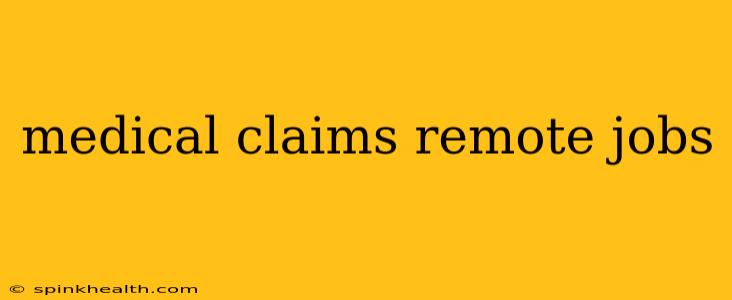The hum of the computer, the gentle click of the keyboard – this is the soundtrack to many modern careers, and increasingly, it's the soundtrack to medical claims processing. The rise of remote work has opened doors for professionals in this field, offering a blend of flexibility and the vital contribution of ensuring accurate and timely healthcare payments. But this world is more nuanced than simply logging in from home. Let's delve into the intricacies of medical claims remote jobs.
What are Medical Claims Remote Jobs?
Imagine a world where healthcare providers could focus solely on patient care, without the administrative burden of managing billing. That's where medical claims processors come in. These individuals are the crucial link between healthcare providers and insurance companies. Their job involves reviewing medical records, ensuring the accuracy of codes, and submitting claims for reimbursement. Remotely, this often involves sophisticated software, secure networks, and a meticulous attention to detail. It’s a role demanding both technical skill and a deep understanding of medical billing practices.
What are the Different Types of Medical Claims Remote Jobs?
The world of medical claims remote work isn't a monolith. The specific tasks and responsibilities can vary quite a bit, leading to a diverse range of roles:
-
Medical Coder: These professionals translate medical diagnoses and procedures into standardized codes used by insurance companies for billing. Remote coders often work independently, using their expertise to accurately reflect patient care in the billing process.
-
Medical Biller: These individuals are responsible for submitting claims, following up on denials, and resolving any discrepancies with insurance companies. Remote billing roles often involve interaction with insurance providers via phone or email.
-
Medical Claims Specialist: This role encompasses both coding and billing, often requiring a broader understanding of the entire claims process. Remote specialists handle the complete workflow from initial coding to final payment processing.
-
Claims Auditor: Auditing involves reviewing claims for accuracy and compliance before submission. Remote auditors play a crucial role in preventing errors and ensuring efficient payment processes.
What Skills and Qualifications are Needed for Medical Claims Remote Jobs?
While the specific requirements can vary depending on the employer and role, some skills and qualifications are almost universally sought after:
-
Medical Terminology: A strong understanding of medical terms, procedures, and diagnoses is essential.
-
Coding Proficiency: Knowledge of medical coding systems like ICD-10 and CPT is crucial for many roles.
-
Billing Software Expertise: Familiarity with various billing software and electronic health record (EHR) systems is often required.
-
Analytical Skills: Medical claims processing necessitates careful attention to detail and the ability to analyze data effectively.
-
Excellent Communication Skills: Clear communication is vital, particularly in resolving billing discrepancies with insurance companies.
-
Strong Computer Skills: Proficiency in various software applications is essential for remote work efficiency.
How Much Do Medical Claims Remote Jobs Pay?
Salary expectations vary significantly depending on experience, location, and the specific role. Entry-level positions might start at a lower salary, while experienced professionals with specialized certifications can command higher earnings. Researching average salaries for your area and desired role is key to understanding potential compensation.
Are There Medical Claims Remote Jobs for Entry-Level Candidates?
Yes, many companies offer entry-level positions for individuals eager to start their careers in medical claims processing. These roles often provide on-the-job training, allowing new employees to develop their skills and expertise. However, some basic knowledge of medical terminology and billing processes is typically beneficial.
What are the Advantages and Disadvantages of Medical Claims Remote Jobs?
Advantages:
-
Flexibility: Remote work offers a superior work-life balance, allowing for a flexible schedule and location.
-
Convenience: Eliminate the commute and enjoy the comfort of working from home.
-
Geographic Reach: Work remotely for companies anywhere in the country (or even globally).
-
Increased Demand: The growing healthcare industry and increasing adoption of remote work create high demand for qualified professionals.
Disadvantages:
-
Isolation: Some individuals may find working remotely isolating, lacking the daily interaction of an office setting.
-
Technology Dependence: Reliable internet access and appropriate technology are essential for successful remote work.
-
Self-Discipline: The ability to manage time effectively and maintain self-discipline is crucial for success in a remote environment.
The world of medical claims remote jobs offers a unique blend of challenge and opportunity. For those with the right skills and dedication, it's a path offering professional fulfillment and a significant contribution to the healthcare system – all from the comfort of home. Remember to research various companies and opportunities, focusing on those that align with your skills and career aspirations.

